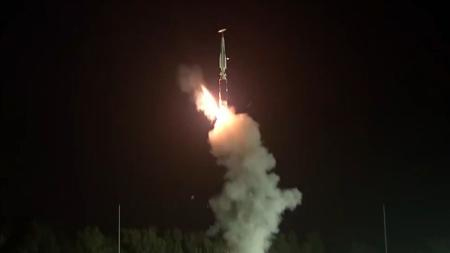news details |
|
|
| India successfully test-fires long-range missile | | | 
New Delhi, Nov 17:
Agencies
In a major boost to its military prowess, India has successfully flight-tested a long-range hypersonic missile off the coast of Odisha, an achievement that has put the country in a select group of nations having the weapon that can strike with extreme speed and evade most air-defence systems.
Defence Minister Rajnath Singh described the missile test on Saturday under the country’s first long-range hypersonic mission as a “stupendous” achievement and a “historic moment”.
The missile, developed by the Defence Research and Development Organisation (DRDO), is designed to carry various payloads for ranges greater than 1,500 km, an official readout said.
“India has achieved a major milestone by successfully conducting flight trial of long range hypersonic missile from Dr APJ Abdul Kalam Island, off-the-coast of Odisha,” Singh said on X.
“This is a historic moment and this significant achievement has put our country in the group of select nations having capabilities of such critical and advanced military technologies,” he said.
Generally, hypersonic missiles, capable of carrying conventional explosives or nuclear warheads, can fly in the range of five times the speed of sound (Mach 5, which is roughly 1,220 kilometres) per hour at sea level.
However, some advanced versions of hypersonic missiles can even fly at the speed of more than 15 mach.
At present, Russia and China are way ahead in developing hypersonic missiles, while the United States is in the process of developing a range of such weapons under an ambitious programme.
Several other countries, including France, Germany, Australia, Japan, Iran and Israel, are also pursuing projects to develop hypersonic-missile systems.
Hypersonic missiles are considered highly manoeuvrable and agile as they can change course mid-way. Ballistic missiles, which can also fly at Mach 5, have limited manoeuvrability in view of their predetermined trajectories.
Singh congratulated the DRDO, the armed forces and the industry for the “stupendous” achievement.
The defence ministry said the missile was tracked by various range systems, deployed in multiple domains.
“The flight data obtained from down range ship stations confirmed the successful terminal manoeuvres and impact with high degree of accuracy,” it said.
This missile has been indigenously developed by the laboratories of Dr APJ Abdul Kalam Missile complex, Hyderabad, along with various other DRDO laboratories and industry partners.
The flight-trial was carried out in the presence of senior DRDO scientists and officers of the armed forces.
The flight-test of the missile comes at a time when India is focusing on bolstering its combat capabilities against the backdrop of China’s aggressive military muscle-flexing.
In the last few years, India has been focusing on the development of next-generation weapon systems, such as drones, hypersonic missiles and equipment with the application of artificial intelligence.
The DRDO has already developed a range of missiles, including “Prithvi”, “Akash” and “Agni”. |
|
|
|
|
|
|
|
|
|
|
|
|
| |
| |
|
|
|
|
 |
|
|
|
|
STOCK UPDATE |
|
|
 |
| BSE
Sensex |
 |
| NSE
Nifty |
|
|
| |
CRICKET UPDATE |
|
|
|
|
|
| |
| |
|
|
| |
|
|
|
|
| |
|
|
|
|
|
|
|
|
|
|
|
|
|
